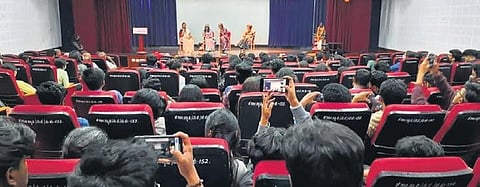

The joyous moment of India celebrating 75 years of independence from British rule also brings back bitter memories of the Partition that caused suffering to an entire generation. While the separation of India and Pakistan is a common theme in cinema, personal narratives of the Partition are hardly documented. Through ‘Speaking in Forgotten Tongues’—a three-day film festival that starts today at the India Habitat Centre—Kriti Film Club attempts to revisit this tragedy with a humane touch through screenings of three documentaries centred on Partition. Along with film screenings, this open-for-all event will also have sessions with experts who will discuss the subjects these films touch upon.
Dialogues between the state and citizen
In her film Iqraar-naama, city-based Priyanka Chhabra revisits the theme of displacement through a series of government documents preserved by Charandas Bangia, a Partition refugee from Lyallpur (now Faisalabad), Pakistan, who now resides in Amritsar. “I decided to make this film about Bangia’s collection of documents—a personal archive—to trace the story of refugees and displaced persons,” says the 37-year-old filmmaker and editor. Land agreements, matriculation certificates, library cards from Bangia’s collegiate days, compensation papers for the property his family left behind, and other documents that are preserved carefully for more than 90 years, set the stage for the filmmaker to unfold history. Made as an extension of Pichla Varka—Chhabra’s film that was commissioned by the Public Service Broadcasting Trust—Iqraar-naama “decentres historical narratives from state archives to personal archives”. Those interested in understanding the journey of making this film can attend a session on Thursday (August 25, 2022) where Chhabra will be in conversation with writer and publisher Urvashi Butalia as they discuss pertinent questions this body of work raises.
Navigating the present through a turbulent past
Shaheen Bagh-resident Mohd Fehmeed’s maternal grandfather (late Mehboob Khan) decided to stay in India during the Partition while the latter’s extended family moved past the western side of the Radcliffe Line. However, the migration did not put an end to their relationship. “My family stayed in touch with their relatives there, shares Fehmeed (27). However, over the last two decades, the family has lost touch with their kin in Pakistan. Fehmeed’s 2021 documentary Ruuposh—it is co-directed by Zeeshan Amir Khan—focuses on the trials, turbulence, successes, and failures of the people who stayed back after the Partition as narrated by his mother (Ruksana Begum). “I was studying in Jamia when the violence [in 2020] happened, and I began pondering ‘If I want to reconnect with my relatives now; can I do that?’,” shares Fehmeed, who created the film last year while pursuing his master’s in Jamia Millia Islamia, Okhla. By touching upon themes of pain, nostalgia, and estrangement, the film also examines the Indian Muslim identity. The screening of this film (on Wednesday) will be followed by a conversation with the filmmakers.
Narratives of friendship and separation
It was the need to document her father’s—Grahanandan Singh—memories from the Partition that pushed Bengaluru-based designer Bani Singh (59) to become a filmmaker. A hockey Olympian who won the gold in the Summer Olympics of 1948 and 1950, Grahanandan played the sport for the undivided Punjab province before the Partition. With the 1947 Partition, many of his friends and former teammates moved to Pakistan and a few became a part of Pakistan’s national team. Bani’s 2021 film Taangh (Longing) originated from a personal conversation, and eventually became an account of the impact of the Partition on personal relationships. “It started with exploring what it was like to win the first gold medal for India but quickly became about Undivided Punjab and what the impact of Partition was on the same,” explains Bani, who, in the process of making this film, travelled to Pakistan to look for Shehzada Mohamad Shah-Rukh—one of her father’s friends. The film, thus, connects missing links in the narratives of the Partition, shedding light on India and Pakistan’s collective cultural history.
CHECK IT OUT
WHAT: ‘Speaking in Forgotten Tongues’
WHEN: Till August 25 For detailed schedule, check @kritifilmclub on Instagram
WHERE: India Habitat Centre, Copernicus Marg